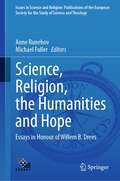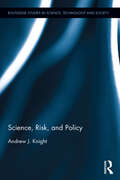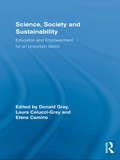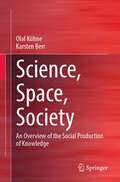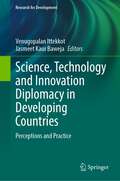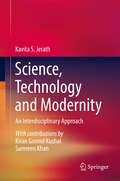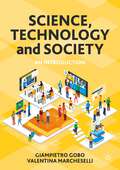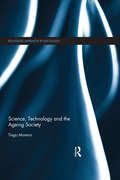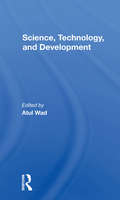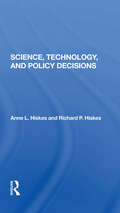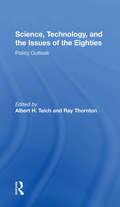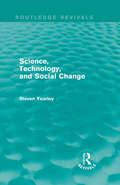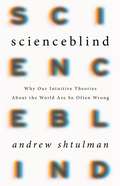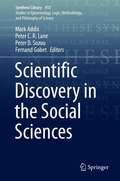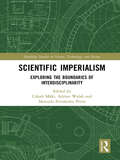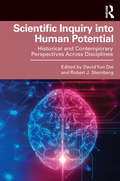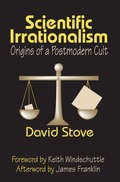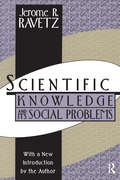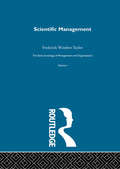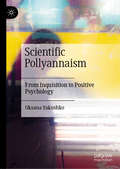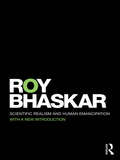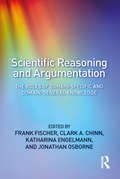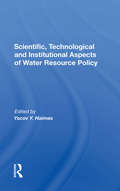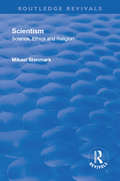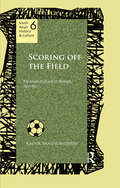- Table View
- List View
Science, Religion, the Humanities and Hope: Essays in Honour of Willem B. Drees (Issues in Science and Religion: Publications of the European Society for the Study of Science and Theology #8)
by Michael Fuller Anne RunehovThis book collects a multidisciplinary range of contributions focusing on the prolific and seminal work of Willem Drees in the fields of philosophy of religion, philosophy of the humanities, and science and theology/religion. Trained in both theoretical physics and theology/philosophy of religion, Drees holds doctoral degrees in both theology and in philosophy and, amongst other distinguished positions, held professorships at the University of Leiden and at the University of Tilburg. Drees was also Editor-in-Chief of Zygon, Journal of Religion & Science, between 2008 and 2018, and served as President of the European Society for the Study of Science and Theology (ESSSAT) between 2002 and 2008. In 2018, he was elected as member of the Royal Holland Society of Sciences and Humanities (KHMW). This contributed volume builds on Drees’ expansive and provocative scholarly contributions, notably around the concept and meaning of naturalism and the humanities to the fields of science and religion, as exemplified by his works Religion, Science and Naturalism (1996) and What Are the Humanities For? (2021). In a time where more and more young people across the globe are entering higher education such cross-disciplinary explorations and (re-)evaluations are vital to the field. Accordingly, by approaching his work from a variety of disciplines this collection illuminates the broad reach of Drees’ work and provides scholars from various fields with many new and rich opportunities avenues for research.
Science, Risk, and Policy (Routledge Studies in Science, Technology and Society #32)
by Andrew J. KnightFor decades, experts and the public have been at odds over the nature and magnitude of risks and how they should be mitigated through policy. Experts argue that the fears of the public are irrational, and that public policy should be based on sound science. The public, on the other hand, is skeptical of experts, and believe policy should represent their interests. How do policy analysts make sense of these competing views? Science, Risk and Policy answers this question by examining how people evaluate evidence, how science is conducted, and how a multi-disciplinary framework to risk can inform policy by bridging the gap between experts and the public. This framework is then applied to four case studies: pesticides, genetically engineered foods, climate change, and nuclear power. By tracing the history of the science, policies and regulations, and evaluating arguments made about these risks, Andrew J. Knight provides a guide to understand how experts and the public view risks.
Science, Society and Sustainability: Education and Empowerment for an Uncertain World (Routledge Research in Education)
by Donald Gray Laura Colucci-Gray Elena CaminoRecent work in science and technological studies has provided a clearer understanding of the way in which science functions in society and the interconnectedness among different strands of science, policy, economy and environment. It is well acknowledged that a different way of thinking is required in order to address problems facing the global community, particularly in relation to issues of risk and uncertainty, which affect humanity as a whole. However, approaches to education in science tend to perpetuate an outmoded way of thinking that is incommensurable with preparing individuals for participation and decision-making in an uncertain, complex world. Drawing on experiences of interdisciplinary dialogue and practice in a higher education context, this book illustrates how reformulating the agenda in science and technology can have a revolutionary impact on learning and teaching in the classroom at all levels. This exceptional study will interest scholars in Education, Science, Technology, and Society, and those looking to further deliberative democracy and civic participation in their students.
Science, Space, Society: An Overview of the Social Production of Knowledge
by Olaf Kühne Karsten BerrThis volume provides a basic introduction to the philosophy of science and its central concepts, theories, and philosophical, scientific, and spatial positions and approaches.
Science, Technology and Innovation Diplomacy in Developing Countries: Perceptions and Practice (Research for Development)
by Venugopalan Ittekkot Jasmeet Kaur BawejaThis book provides a developing country perspective on the internationalization of science and the role of Science, Technology and Innovation Diplomacy (STID) in leveraging scientific cooperation for sustainable development. In articles by individuals from government departments and academic & research institutions in nine developing countries, it provides a conceptual understanding of the subject and reveals the prevailing perceptions on its praxis/practices. The articles highlight the significance of international cooperation at bilateral, regional and multilateral levels and the need for strengthening the role of STID in foreign policy and strategies of governments. The book is a useful reference material to government officials, diplomats,academicians, researchers, science counsellors, international relations experts, science and technology professionals and other stakeholders from the developing countries and transition economies, dealing with economic and developmental policy issues and/or science, technology and innovation (STI) issues in understanding the praxis and prospects of STID. The book is also useful for scholars and international relations experts from developed countries in understanding STI and related issues that affect the relationship of developing countries and transition economies with their partners from the developed world.
Science, Technology and Modernity: An Interdisciplinary Approach
by Kavita S. JerathThis book provides a full scale description and discussion of science, technology, society, cross-cultural communication and modernity and is presented at a level that makes it accessible to the interested academic. Starting with the historical overview, the text outlines the relevance of technology today and in the future. Then follows an introduction to the discovery and invention by agricultural, feudal, capitalist and socialist systems, and conversely the ways in which science and technology has altered economic, social, and political beliefs and practices during industrial revolutions and have transformed the whole nature of human society. Tracing the relationship between science and technology from dawn to civilization to the twenty first century, the book argues that technology is applied science and vice versa and this phenomenon emerged relatively recently, as industry and governments began funding scientific research that would lead to new technologies. The book goes beyond technology by also describing the path from modernity to post modernity and discussing the theories of modernity. Further the internet and social media receive increased attention as well. Finally, the discussion turns to the future structure of society and gender equality, expected to have a more distributed future generation, thereby addressing the synergies between education system, globalization and cross-cultural communication.This book is designed as the primary general textbook for Engineers at the undergraduate level in any university. This course is a multidisciplinary elective course from emerging areas in the 4- year institution and is a required course in most universities.
Science, Technology and Society: An Introduction
by Giampietro Gobo Valentina MarcheselliScience, Technology and Society: An Introduction provides students with an accessible overview of the interdisciplinary field of Science and Technology Studies (STS). The discipline breaks down traditional conceptions of knowledge as universal, neutral and ahistorical, and takes a more critical approach to science and technology as social embedded phenomena. This comprehensive textbook makes use of unique examples and case studies to illustrate theoretical debates and concepts. In addition, the reader acquires a unique vision of contemporary issues (such as the power of algorithms, the mystification of fake news, the role of experts within the decision-making process, for example). Each chapter incorporates pedagogically rich features, including interactive discussion points to be used individually or in class as prompts for debate.
Science, Technology and the Ageing Society (Routledge Advances in Sociology)
by Tiago MoreiraAgeing is widely recognised as one of the social and economic challenges in the contemporary, globalised world, for which scientific, technological and medical solutions are continuously sought. This book proposes that science and technology also played a crucial role in the creation and transformation of the ageing society itself. Drawing on existing work on science, technology and ageing in sociology, anthropology, history of science, geography and social gerontology, Science, Technology and the Ageing Society explores the complex, interweaving relationship between expertise, scientific and technological standards and social, normatively embedded age identities. Through a series of case studies focusing on older people, science and technology, medical research about ageing and ageing-related illnesses, and the role of expertise in the management of ageing populations, Moreira challenges the idea that aging is a problem for the individual and society. Tracing the epistemic and technological infrastructures that underpin multiple of ways of aging, this timely volume is a crucial tool for undergraduate and graduate students interested in social gerontology, health and social care, sociology of aging, science and technology studies and medical sociology.
Science, Technology, And Development
by Atul WadThis book examines issues specific to the regions of Latin America and Africa and deals with an issue that Africa has shown the least progress in terms of science and technology and yet it is a region where the needs are urgent in human terms.
Science, Technology, And Policy Decisions
by Anne L. Hiskes Richard P. HiskesThis text, written by a philosopher of science and a political theorist, introduces students to the issues and controversies surrounding science and technology policy in the United States. As the impact of technological advancement is increasingly felt, the policy-making process for science and technology is undergoing a marked transition. The making of this policy is no longer solely the function of government agencies and institutions. New actors in the policy arena are raising questions about the future of technological advancement in the United States and elsewhere, and their voices are affecting—sometimes obstructing—the traditional policy process. This book surveys the entire domain of science and technology policy making with special emphasis on the growing role of citizen participation, the ethical issues raised by modern policy problems, and the general principles that guide current policy. The authors discuss current philosophical views about the nature of science and technology as social and political entities and also consider the history of the relations between these fields and political authority. They combine an issues and case study approach with a narrative discussion of how ethical, participatory, and institutional factors have merged in the policy process. Among the topics addressed are nuclear power and siting policy, hazardous waste, communications technology, and biomedical technology. After reviewing the difficult problems facing the modern policy maker, the authors assess the methods and ethical assumptions of the current policy-making framework and consider alternatives that are more sensitive to the complexity of contemporary policy issues. Intended as a core text for courses in "Science, Technology, and Public Policy," the book can also be used in interdisciplinary courses focusing on the relationship between science, technology, and society. The text is also appropriate for courses in the philosophy of science and technology and for courses in social and political philosophy.
Science, Technology, And The Issues Of The Eighties: Policy Outlook
by Albert H. Teich Ray ThorntonFirst published in 1982. Recognizing that science and technology have become increasingly relevant to important public policy issues, Congress has mandated the periodic preparation of a "Five Year Outlook for Science and Technology" to help U.S. policymakers anticipate and deal with these issues more effectively. This book, the result of a study conducted by the American Association for the Advancement of Science for the second such "Outlook," identifies and explores domestic and international policy concerns in which science and technology are critical factors. The authors’ interdisciplinary, nontechnical approach provides policymakers, students and others interested in science, technology and public affairs with a timely overview of nine areas that are likely to become the world’s most pressing concerns over the years.
Science, Technology, and Social Change (Routledge Revivals)
by Steven YearleyFirst published in 1988, this book provides students with a way to increase their understanding of the role of science and technology in society. Steven Yearley draws on and develops ideas from research in the sociology and politics of science to address, in particular: the nature of scientific knowledge and the authority it commands; the political and economic role of science in the West; the relationship between science, technology, and social change in underdeveloped countries. Examples used range from nineteenth-century brain science to the strategic defence initiative, and from hugely expensive experiments in nuclear physics, to proposals for inexpensive boat-building programmes in the Sudan. Overall, this reissue provides a comprehensive and stimulating account of the role played by science and technology in contemporary social change.
Scienceblind: Why Our Intuitive Theories About the World Are So Often Wrong
by Andrew ShtulmanHumans are born to create theories about the world--unfortunately, they're usually wrong, and keep us from understanding the world as it really isWhy do we catch colds? What causes seasons to change? And if you fire a bullet from a gun and drop one from your hand, which bullet hits the ground first? In a pinch we almost always get these questions wrong. Worse, we regularly misconstrue fundamental qualities of the world around us. In Scienceblind, cognitive and developmental psychologist Andrew Shtulman shows that the root of our misconceptions lies in the theories about the world we develop as children. They're not only wrong, they close our minds to ideas inconsistent with them, making us unable to learn science later in life. So how do we get the world right? We must dismantle our intuitive theories and rebuild our knowledge from its foundations. The reward won't just be a truer picture of the world, but clearer solutions to many controversies-around vaccines, climate change, or evolution-that plague our politics today.
Scientific Discovery in the Social Sciences (Synthese Library #413)
by Fernand Gobet Mark Addis Peter C. R. Lane Peter D. SozouThis volume offers selected papers exploring issues arising from scientific discovery in the social sciences. It features a range of disciplines including behavioural sciences, computer science, finance, and statistics with an emphasis on philosophy.The first of the three parts examines methods of social scientific discovery. Chapters investigate the nature of causal analysis, philosophical issues around scale development in behavioural science research, imagination in social scientific practice, and relationships between paradigms of inquiry and scientific fraud. The next part considers the practice of social science discovery. Chapters discuss the lack of genuine scientific discovery in finance where hypotheses concern the cheapness of securities, the logic of scientific discovery in macroeconomics, and the nature of that what discovery with the Solidarity movement as a case study. The final part covers formalising theories in social science. Chapters analyse the abstract model theory of institutions as a way of representing the structure of scientific theories, the semi-automatic generation of cognitive science theories, and computational process models in the social sciences.The volume offers a unique perspective on scientific discovery in the social sciences. It will engage scholars and students with a multidisciplinary interest in the philosophy of science and social science.
Scientific Imperialism: Exploring the Boundaries of Interdisciplinarity (Routledge Studies in Science, Technology and Society)
by Uskali Mäki Adrian Walsh Manuela Fernández PintoThe growing body of research on interdisciplinarity has encouraged a more in depth analysis of the relations that hold among academic disciplines. In particular, the incursion of one scientific discipline into another discipline’s traditional domain, also known as scientific imperialism, has been a matter of increasing debate. Following this trend, Scientific Imperialism aims to bring together philosophers of science and historians of science interested in the topic of scientific imperialism and, in particular, interested in the conceptual clarification, empirical identification, and normative assessment of the idea of scientific imperialism. Thus, this innovative volume has two main goals. Indeed, the authors first seek to understand interdisciplinary relations emerging from the incursion of one scientific discipline into one or more other disciplines, such as in cases in which the conventions and procedures of one discipline or field are imposed on other fields; or more weakly when a scientific discipline seeks to explain phenomena that are traditionally considered proper of another discipline’s domain. Secondly, the authors explore ways of distinguishing imperialistic from non-imperialistic interactions between disciplines and research fields. The first sustained study of scientific imperialism, this volume will appeal to postgraduate students and postdoctoral researchers interested in fields such as Science and Technology Studies, Sociology of Science & Technology, Philosophy of Science, and History of Science.
Scientific Inquiry into Human Potential: Historical and Contemporary Perspectives Across Disciplines
by David Yun Dai and Robert J. SternbergScientific Inquiry into Human Potential explores the intellectual legacy and contemporary understanding of scientific research on human intelligence, performance, and productivity. Across nineteen chapters, some of the most eminent scholars of learning and psychology recount how they originated, distinguished, measured, challenged, and adapted their theories on the nature and nurture of human potential over decades of scientific research. These accessible, autobiographical accounts cover a spectrum of issues, from the biological underpinnings and developmental nature of human potential to the roles of community, social interaction, and systematic individual differences in cognitive and motivational functioning. Researchers, instructors, and graduate students of education, psychology, sociology, and biology will find this book not only historically informative but inspiring to their own ongoing research journeys, as well.
Scientific Irrationalism: Origins of a Postmodern Cult
by David StoveLittle known outside his native Australia, David Stove was one of the most illuminating and brilliant philosophical essayists of his era. A fearless attacker of intellectual and cultural orthodoxies, Stove left powerful critiques of scientific irrationalism, Darwinian theories of human behavior, and philosophical idealism.Since its inception in the 1940s, the field of science studies, originally intended to bridge the gap between science and the humanities, has been the center of controversy and debate. The most notable figures in this debate are Thomas Kuhn and Karl Popper. In Scientific Irrationalism, now available in paperback, David Stove demonstrates how extravagant has been the verbiage wasted on this issue and how irrational the combatants have been. He shows that Kuhn and Popper share considerable common ground. Stove argues that the problems all reside in the reasoning of the critics. He identifies the logical mistakes and conceptual allusions made by Kuhn and Popper and their supporters, as well as their collective dependency on a single argument made by the philosopher of the Scottish Enlightenment, David Hume. He then demonstrates how little potency that argument actually has for the claims of science.In his foreword, Keith Windschuttle explains the debate surrounding the field of science studies and explores David Stove's contribution as well as his lack of recognition. In an afterword, James Franklin discusses reactions to Stove's work.
Scientific Knowledge and Its Social Problems
by Jerome R. RavetzScience is continually confronted by new and difficult social and ethical problems. Some of these problems have arisen from the transformation of the academic science of the prewar period into the industrialized science of the present. Traditional theories of science are now widely recognized as obsolete. In Scientific Knowledge and Its Social Problems (originally published in 1971), Jerome R. Ravetz analyzes the work of science as the creation and investigation of problems. He demonstrates the role of choice and value judgment, and the inevitability of error, in scientific research. Ravetz's new introductory essay is a masterful statement of how our understanding of science has evolved over the last two decades.
Scientific Management (The\making Of Sociology Ser.)
by Frederick Winslow TaylorThis volume comprises three works originally published separately as Shop Management (1903), The Principles of Scientific Management (1911) and Testimony Before the Special House Committee (1912). Taylor aimed at reducing conflict between managers and workers by using scientific thought to develop new principles and mechanisms of management. In contrast to ideas prevalent at the time, Taylor maintained that the workers' output could be increased by standardizing tasks and working conditions, with high pay for success and loss in case of failure. Scientific Management controversially suggested that almost every act of the worker would have to be preceded by one or more preparatory acts of management, thus separating the planning of an act from its execution.
Scientific Pollyannaism: From Inquisition to Positive Psychology
by Oksana YakushkoThis book argues that the story of the orphan girl Pollyanna (namely, her strategy of playing the “glad games” to manage loss, abuse, and social prejudice) serves as a framework for critiquing historical forms of Western scientific Pollyannaism. The author examines Pollyannaism as it relates to the sciences, demonstrating how the approach has been used throughout modern Western history to enforce happiness and to criticize negative human emotional states. These efforts, carried out by scientists and popularized as scientific, focus on negating the role of the environment and on promoting varied forms of emotional control. Ultimately, the book emphasizes strategies used to compel individuals into becoming Pollyannas about science itself.
Scientific Realism and Human Emancipation (Classical Texts in Critical Realism (Routledge Critical Realism))
by Roy BhaskarFollowing on from Roy Bhaskar’s first two books, A Realist Theory of Science and The Possibility of Naturalism, Scientific Realism and Human Emancipation, establishes the conception of social science as explanatory—and thence emancipatory—critique. Scientific Realism and Human Emancipation starts from an assessment of the impasse of contemporary accounts of science as stemming from an incomplete critique of positivism. It then proceeds to a systematic exposition of scientific realism in the form of transcendental realism, highlighting a conception of science as explanatory of a structured, differentiated and changing world. Turning to the social domain, the book argues for a view of the social order as conditioned by, and emergent from, nature. Advocating a critical naturalism, the author shows how the transformational model of social activity together with the conception of social science as explanatory critique which it entails, resolves the divisions and dualisms besetting orthodox social and normative theory: between society and the individual, structure and agency, meaning and behavior, mind and body, reason and cause, fact and value, and theory and practice. The book then goes on to discuss the emancipatory implications of social science and sketches the nature of the depth investigation characteristically entailed. In the highly innovative third part of the book Roy Bhaskar completes his critique of positivism by developing a theory of philosophical discourse and ideology, on the basis of the transcendental realism and critical naturalism already developed, showing how positivism functions as a restrictive ideology of and for science and other social practices.
Scientific Reasoning and Argumentation: The Roles of Domain-Specific and Domain-General Knowledge
by Frank Fischer Jonathan Osborne Clark A. Chinn Katharina EngelmannCompetence in scientific reasoning is one of the most valued outcomes of secondary and higher education. However, there is a need for a deeper understanding of and further research into the roles of domain-general and domain-specific knowledge in such reasoning. This book explores the functions and limitations of domain-general conceptions of reasoning and argumentation, the substantial differences that exist between the disciplines, and the role of domain-specific knowledge and epistemologies. Featuring chapters and commentaries by widely cited experts in the learning sciences, educational psychology, science education, history education, and cognitive science, Scientific Reasoning and Argumentation presents new perspectives on a decades-long debate about the role of domain-specific knowledge and its contribution to the development of more general reasoning abilities.
Scientific, Technological And Institutional Aspects Of Water Resource Policy
by Yacov Y. HaimesThis volume addresses water policy issues related to water resources research, ground water, water conservation, urban water systems, water resource planning, supply and demand interaction, principles and standards, and cost-benefit analysis, as well as general, institutional aspects of local, state, regional, and federal policies. The five contributors are scientists with expertise in water resources policy; their associations with Congress, the administration, state and local governments, private industry, and the academic community provide broad perspectives of their subject. The focus of their concerns is the Carter administration's Water Policy Initiatives submitted to Congress in June 1978.
Scientism: Science, Ethics and Religion (Routledge Revivals)
by Mikael StenmarkThis title was first published in 20/11/2001: The intellectual and practical successes of science have led some scientists to think that there are no real limits to the competence of scienece, and no limits to what can be achieved in the name of science. This view (and similar views) have been called Scientism. In this book, scientists' views about science and its relationship to knowledge, ethics and religion are subjected to critical scrutiny. A number of natural scientists have advocated Scientism in one form or another - Francis Crick, Richard Dawkins, Carl Sagan, and Edward O. Wilson - and their impact inside and outside the sciences is considered. Clarifying what Scientism is, this book proceeds to evaluate its key claims, expounded in questions such as: is it the case that science can tell us everything there is to know about reality? Can science tell us how we morally ought to live and what the meaning of life is? Can science in fact be our new religion? Ought we become "science believers"? The author addresses these and similar issues, concluding that Scientism is not really science but disguised materialism or naturalism; its advocates fail to see this, not being sufficiently aware that their arguments presuppose the previous acceptance of certain extra-scientific or philosophical beliefs
Scoring Off the Field: Football Culture in Bengal, 1911–80 (South Asian History And Culture Ser.)
by Kausik BandyopadhyayThis book examines how football, as a mass spectator sport, came to represent a novel, unique cultural identity of Bengali people in terms of nation, community, region/locality and club, contributing to the continuity of everyday socio-cultural life. It explains how football became a viable popular social force with a rare emotional spontaneity and peculiar self-expressive fan culture against the background of anti-imperial nationalist movement and postcolonial political tension and social transformation. In the process, it investigates certain key questions and problems in the social history of football in Bengal, which have hitherto been ignored in the existing works on the subject.The author offers some original arguments in treating football as a cultural phenomenon, setting it squarely in the context of Bengali politics and society. It strengthens the premise that social history of South Asian sport can be meaningfully understood only by looking beyond the sports field. The study, using sport as a lens, has tried to consider some relevant themes of social history, and brings forth important issues of political and cultural history of 20th-century Bengal. Simultaneously, it highlights the transformed role of football as an instrument of reaction, resistance and subversion. It indicates that the football field of Bengal proves to be a mirror image of what society experiences in its cultural and political field, through a series of historical projections of identity, difference and culture.
